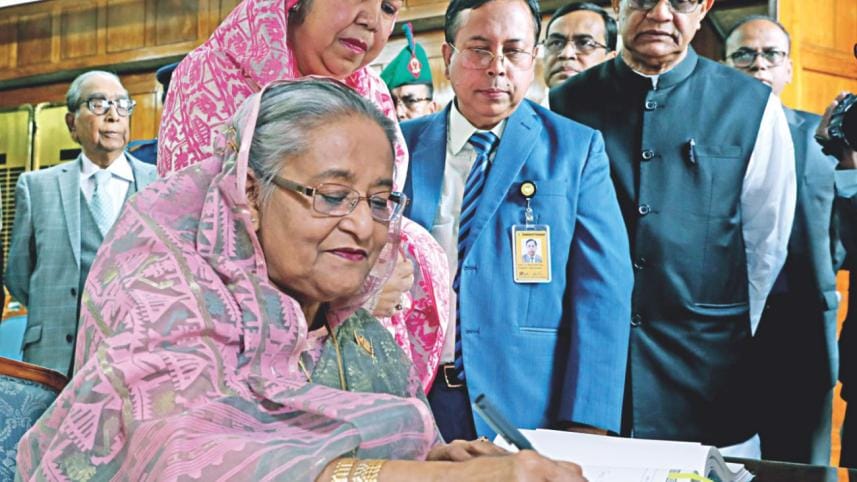Instance not necessary

Lawmakers elected in Sunday's polls took oath as members of the 11th parliament yesterday with the 10th Jatiya Sangsad still in place.
The same thing happened five years ago when the lawmakers, elected in the 10th national polls, were sworn in, constituting the current parliament two weeks before the dissolution of the ninth JS.
But the constitutional provisions do not allow the MPs, elected in Sunday's polls, to take oath and assume office before the expiry of the existing parliament's tenure.
According to article 123 (3) (b), the lawmakers, elected in the December 30 polls, are required to wait for the expiry of the term of the current parliament.
Article 72 (3) clearly says, "Unless sooner dissolved by the president, parliament shall stand dissolved on the expiration of the period of five years from the date of its first meeting."

The first sitting of the 10th parliament was held on January 29, 2014, meaning its five-year tenure will expire on January 28.
One may argue that the MPs sworn in yesterday would not assume office before January 28. Such argument does not have any substance.
This is because, according to article 148 (3), MPs assume office immediately after taking oath.
After swearing in as lawmakers, the ruling Awami League MPs held their parliamentary party meeting, elected party President Sheikh Hasina as their leader and passed a resolution to this effect.
The resolution proves that Hasina commands support of the majority of lawmakers in the newly constituted parliament. Her party won 257 of the 300 seats in the election.
President Abdul Hamid invited Hasina to form a new government when she met him yesterday afternoon. He will appoint her as the PM and administer the oath of office.
On advice of the newly appointed PM, the president will appoint other ministers and state ministers.
In parliamentary democracy, one of the major functions of parliament is to form a government.
The Jatiya Party, which emerged as the second largest party in Sunday's election, held its parliamentary party meeting immediately after its MPs took oath yesterday.
They decided to be a part of the new government.
AN UNUSUAL INSTANCE
Our lawmakers yesterday set an instance that cannot be found in any other existing parliamentary democracy.
Countries such as the UK -- birthplace of Westminster style of parliamentary democracy -- New Zealand, Australia and Canada go to general elections, dissolving their parliaments. The question of constituting a parliament keeping the existing one in place does not arise there.
India is the only exception. Over the past 65 years, it has held 16 general elections.
Its parliament, popularly known as Lok Sabha, existed during the general election on several occasions. But in those cases, new parliament was not constituted, keeping the existing one in place.
Take the formation of the current 16th Lok Sabha for example.
Elections were held in nine phases from April 7 to May 12 in 2014. The 15th Lok Sabha existed during the polls.
As soon as the election results were announced, the then President Pranab Mukherjee on May 18 dissolved the 15th Lok Sabha with immediate effect, completing a formality before the constitution of the new House, according to a NDTV report published on May 18, 2014.
The MPs, elected in the 16th Lok Sabha polls, took oath on June 5, 2014.
But for Bangladesh, things are different.
Asked, Law, Justice and Parliamentary Affairs Minister Anisul Huq said there is no constitutional bar on newly elected MPs in taking oath with the current parliament in place.
"The maiden session of the 11th parliament will be held after the tenure of the present parliament ends on January 28."




 For all latest news, follow The Daily Star's Google News channel.
For all latest news, follow The Daily Star's Google News channel.
Comments